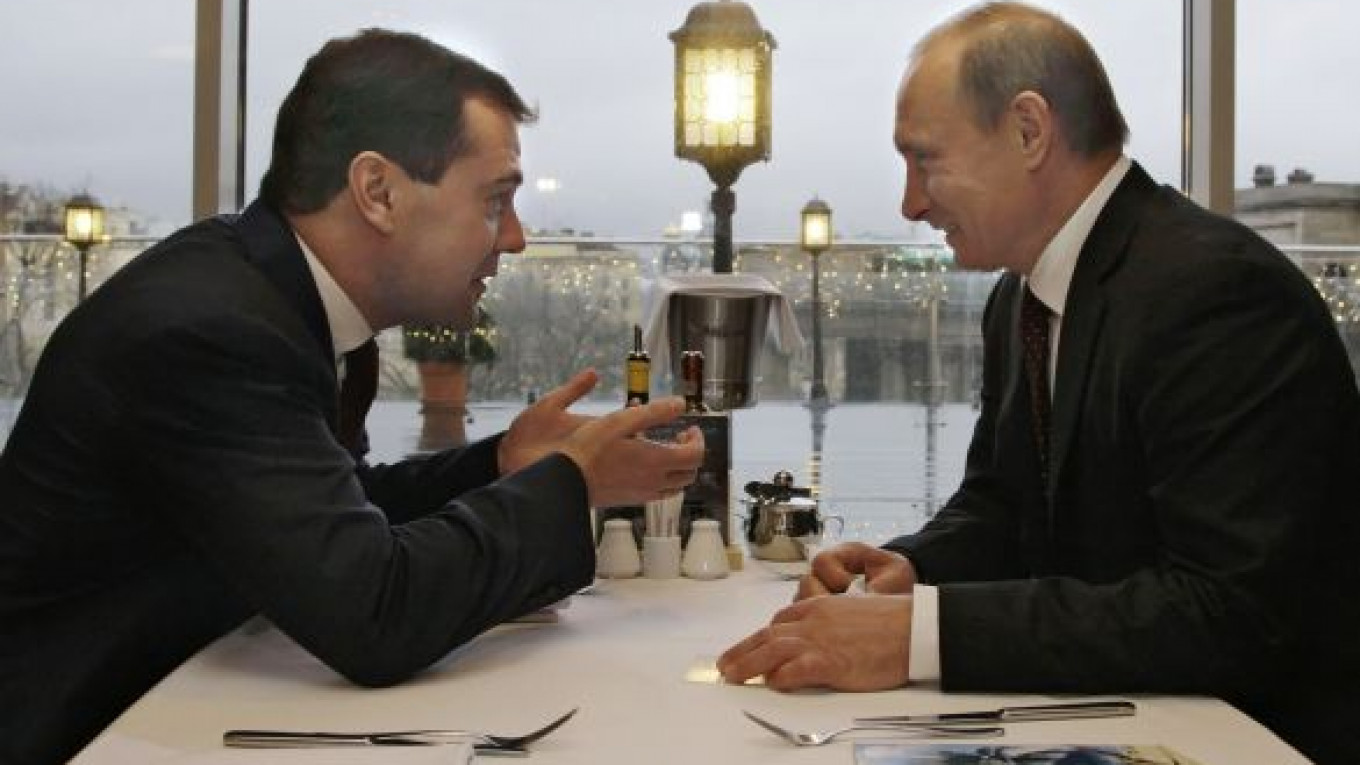Prime Minister Vladimir Putin addressed United Russia’s 11th party congress Saturday in St. Petersburg, where he congratulated his government for averting economic disaster and rehashed a set of policy ideas for the coming year.
Putin offered mild praise to the governing party, which had just met with a harsh rebuke from President Dmitry Medvedev, and promoted government programs in his first major domestic policy speech since the president’s state-of-the-nation address.
“Russia’s economy is showing the first signs of recovery. However, it’s too early to speak about the end of the crisis. There are serious hurdles in a number of industries,” Putin said in comments posted on the government web site.
The prime minister outlined a range of policy areas where he said the government would focus next year, including: modernizing strategically important companies, developing the country’s high-tech sector, stimulating housing construction, boosting domestic demand and dealing with unemployment, especially in single-industry towns.
Putin pointed to the struggling automotive industry as one where the government has a particularly urgent role to play, singling out AvtoVAZ, the country’s biggest carmaker, for support. (Story, Page 6.)
“Car production has contracted by 60 percent. That’s why anti-crisis measures in this industry should be not only preserved but also increased,” he said.
Putin pledged to launch a controversial “cash-for-clunkers” program, in which the government would give 50,000 rubles ($1,274) to car owners who trade in cars more 10 years old for newer, domestically made vehicles.
He also proposed a pilot program to develop single-industry towns, which would start in AvtoVAZ’s hometown, Tolyatti.
“We’re talking about new infrastructure, roads, modern production facilities, techno-parks and ‘business incubators,’” he said.
Modernizing Russia’s economy and industrial base has been a goal pushed hard by Medvedev, who emphasized the topic again in his speech to United Russia.
He said United Russia would preserve its dominance in Russia’s political system only if it could help modernize the country’s economy.
“United Russia will be able to preserve its dominating position in the political system under the only condition, if it is able not only to stabilize the situation in the country but also modernize the economy — that’s the main task today,” he said.
Putin referred back to Medvedev’s state-of-the-nation address, saying Medvedev’s calls for modernization “reflect the mood of the entire Russian society.”
“Today, a very difficult goal stands before us, but one that can absolutely be realized and fulfilled,” he said.
As evidence of the success of his government’s policies, Putin pointed to a less-than-expected decline in gross domestic product and lowered inflation.
“The decline in GDP by the end of the year will not be as big as we thought. Our calculation was at 10 percent or maybe even more,” he said, adding that Russia’s economy would return to the precrisis level not earlier than in two to three years.
The government is now projecting an 8 percent to 8.5 percent drop for the year.
Putin also said the inflation rate “would fall substantially” from 13.3 percent in 2008 to 9.6 percent in 2009, which was one of the lowest indicators since 1992.
Nevertheless, 9 percent, not to mention 10 percent, is “intolerably high” and the government will continue implementing its anti-inflation program, he said.
Putin also called for the extension of several government programs, some because they had been successful and others because they hadn’t worked out yet.
The government’s 300 billion ruble ($10.3 billion) program for loan guarantees has not been effective enough and must be corrected, he said. He vowed that the state guarantees program would be implemented in full by the end of 2009 as planned initially. “We’ll continue this program in 2010. Enterprises will be able to raise more than 500 billion rubles in loans,” he said.
Critics have knocked the program of state guarantees, saying the bureaucratic hoops that banks and other enterprises had to jump through in order to qualify made them all but unattainable.
Putin also pushed a new mortgage program announced last week. The government plans to use 250 billion rubles from the Pension Fund to buy mortgage bonds, with the aim of pushing down interest rates on mortgages.
“In order for mortgages to become cheaper, rates should fall to 10 to 11 percent,” he said. “We have two sources for that purpose — the National Welfare Fund and pension savings being managed by Vneshekonombank.”
Putin said Thursday that the average mortgage rate of 14.5 was “too much.”
The prime minister also repeated pledges to provide support for the labor market, as the situation there was “very strained.”
The government will give 36 billion rubles in 2010 in order to support employment, Putin said, adding that it was less than in 2009, but was nonetheless “a significant sum.”
The country’s jobless rate was 7.7 percent in October, up from the September figure of 7.6 percent, the State Statistic Service said Friday.
In January, the government presented a 43 billion ruble employment stimulus package to fund region-specific job retraining programs, relocation assistance, small business development and job creation.
A Message from The Moscow Times:
Dear readers,
We are facing unprecedented challenges. Russia's Prosecutor General's Office has designated The Moscow Times as an "undesirable" organization, criminalizing our work and putting our staff at risk of prosecution. This follows our earlier unjust labeling as a "foreign agent."
These actions are direct attempts to silence independent journalism in Russia. The authorities claim our work "discredits the decisions of the Russian leadership." We see things differently: we strive to provide accurate, unbiased reporting on Russia.
We, the journalists of The Moscow Times, refuse to be silenced. But to continue our work, we need your help.
Your support, no matter how small, makes a world of difference. If you can, please support us monthly starting from just $2. It's quick to set up, and every contribution makes a significant impact.
By supporting The Moscow Times, you're defending open, independent journalism in the face of repression. Thank you for standing with us.
Remind me later.


